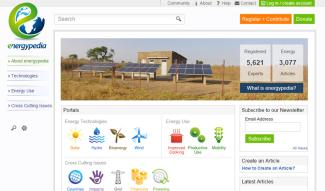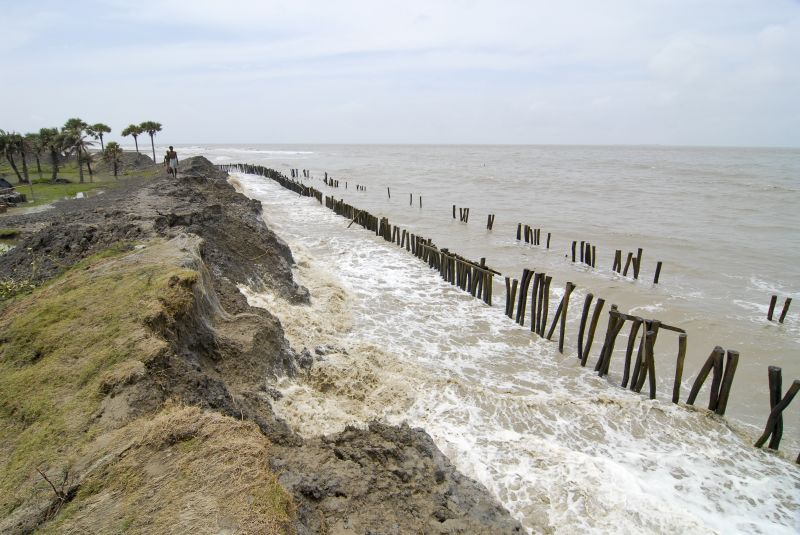Internet
Networking people and knowledge

How do you plan a small hydropower project? How are small solar installations best made affordable? And how does one market fuel-efficient cooking stoves? Answers to questions like these are found on the web platform www.energypedia.info. Operated by a non-profit company and funded by grants, donations and revenues of its subsidiary energypedia consult, the website addresses questions specifically relating to energy access, renewable energy and energy efficiency in developing countries (see box).
As with Wikipedia, all content is freely available. Every article on the platform can be read or downloaded by any website visitor. To contribute to the content, users must register. They can then write new articles, edit existing ones and upload or link documents. They can also post details of upcoming events on the calendar, announce job vacancies or get in touch with other users. Apart from that, they can write private messages to other users or address questions to the entire energypedia community.
An average of nearly 36,000 people (unique visitors) a month visited energypedia in 2015. The platform has more than 5,000 registered users and includes over 3,000 articles on diverse topics. Most of the content is in English but there are also Spanish and French articles, for instance on biogas plants and cooking energy.
Easily accessible content
Portals for specific technologies and topics organise the content for easier access. For instance, there are portal pages on solar power, bioenergy, wind power, improved cooking energy, impacts, funding, productive use of energy, sustainable mobility or energy in agriculture. A country portal offers information on the energy situation in various nations.
To facilitate navigation within the portals, keywords serve to link articles to various categories. Clicking on the category heading “Biogas”, for example, pulls up a list of more than 140 related articles. Selecting “Impacts” provides access to over 90 pages of content. Narrowing down the search to the subcategory “Solar Pumping” directs the user to 15 articles.
Apart from articles, energypedia also offers access to a number of databases, which organise content according to predefined criteria and enable users to search for particular features or to sort results by various attributes. Depending on the database, for example, relevant parameters include year, author, producer, country, technology and others.
In the Clean Energy Project Resource Center, for instance, users will find tenders for procurement and relating documents, economic analyses and even case studies. The two underlying databases for renewable energy and energy efficiency were developed by energypedia in conjunction with the World Bank’s Energy Sector Management Assistance Program (ESMAP) and other institutions. Other databases are available for energy publications relating to Mozambique, small solar appliances (PicoPV) and hydropower plants.
energypedia is a member of the Climate Knowledge Brokers Group, an alliance of actors committed to improving access to information about climate-related issues. Energypedia contributes to the “Climate Tagger”, a tool of the group that enables organisations to categorise and pool their online data and information resources on the basis of linked open data.
User behaviour and motivation
True to the wiki concept of user-generated content, the team behind energypedia limits its activity to offering support for authors, ensuring the smooth technical functioning of the platform, keeping quality standards high and continuously improving user-friendliness.
The positive response to energypedia content is evident in more than only growing numbers of visitors and registered users. In a survey conducted in summer 2015, 87 % of respondents stated they were “very satisfied” or “satisfied” with energypedia’s services. Nearly 60 % declared they had recommended the platform to other people. Almost a third of the 185 respondents were from Europe and Central Asia; a quarter from Africa and a fifth from South Asia.
A third of respondents worked in the private sector, followed by the government sector and the non-profit sector.
The majority of respondents consulted energypedia to update their knowledge of developments in regard to renewable energy. Nearly a quarter said they also used energypedia to improve their own projects, drawing on the experiences of others. Twenty percent used energypedia for research purposes.
However, the user survey also showed that more than 40 % of respondents did not know how they could add new articles or edit existing ones. And that was so even though the site has an extensive help section and the energypedia team offers email, Skype and telephone support. “That was one of the most eye-opening results of the survey for us,” says Ranisha Basnet, energypedia’s community manager. To plug the information gap, energypedia added a more prominently displayed help box on the homepage and included a number of short videos on how to use the site.
The wiki idea that different people can work together on content online still strikes some as an extraordinary concept. “We are often asked whether it does not cause problems that articles can be edited by other users and not just by the authors themselves. But experience shows the opposite: many users have inhibitions about editing another person’s article. In actual fact, we would welcome more peer editing in order to keep articles dynamic and up to date,” Basnet says.
A watchlist helps users find out who changes what in an article. If they add an article to the list, they are automatically informed of any changes. Basnet points out that every revision can be seen and reversed in the article’s history, so there is no need for concern. “That is the great thing about a wiki,” she laughs, “you can try out a lot and needn’t worry about spoiling anything.”
Lisa Feldmann is energypedia’s communication manager. GIZ was involved in initiating the platform, which became independent in 2012.
lisa.feldmann@energypedia.info









